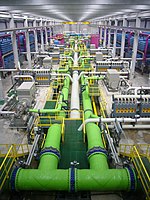
Photo from wikipedia
Abstract The saline, thermal, and chemical pollution associated with the direct discharge of concentrated brine from various desalination processes are the main negative environmental impacts of seawater desalination. Thus, a… Click to show full abstract
Abstract The saline, thermal, and chemical pollution associated with the direct discharge of concentrated brine from various desalination processes are the main negative environmental impacts of seawater desalination. Thus, a novel spray-evaporation multi-effect distillation (SE-MED) desalination system is proposed to eliminate wastewater discharges and achieve zero liquid discharge, in which the spray evaporation technology was adopted for the recovery of freshwater and salts from the brine concentrate disposal. A three-level energy recovery process was adopted in the SE-MED desalination system to improve the thermal efficiency and freshwater productivity. A comprehensive thermodynamic study for the integrated system was carried out to investigate its parametric sensitivity. A three-effect SE-MED desalination system with effects temperature difference of 4.5 °C and heat source temperature of 500 °C was prove suitable for the integrated SE-MED system to balance the system performance, capital cost, and system reliability. Exergy analysis was also conducted for a better understanding of the SE-MED system. The highest exergy destruction (67.76%) occurred in the spray evaporation tank. The useful exergy efficiency was 1.13% and a large amount of surplus exergy is wasted in the process of achieving ZLD.
Journal Title: Desalination
Year Published: 2021
Link to full text (if available)
Share on Social Media: Sign Up to like & get
recommendations!